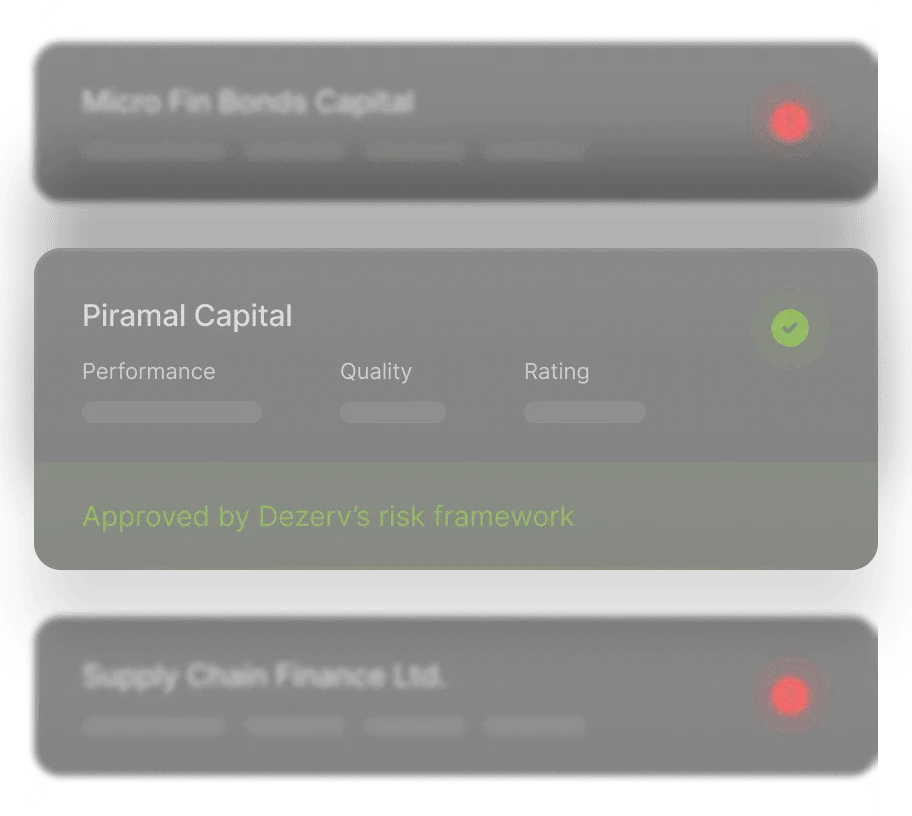The information provided are for general consumption only. Do not construe this as an offer/advice/research to buy/sell any securities
Perpetual Bonds
Perpetual bonds make regular interest payments to bondholders indefinitely, or in other words, perpetually. With these bonds, investors do not receive the principal amount back unless the issuer of the perpetual bond exercises their right to call the bond back. This action involves returning the principal and discontinuing interest payments to bondholders. In India, banks are the primary entities that issue perpetual bonds to meet their capital requirements. Even though perpetual bonds do not provide principal repayment to investors, they can be an attractive investment option for individuals aiming to generate a stable income for a long period of time.
Filters
Showing list of 150 bonds
Perpetual bonds in India
Perpetual bonds, as the name suggests, pay interest perpetually or forever. If you invest in a perpetual bond, you get interest forever as per the bond’s term. However, the bond issuer generally embeds a ‘call option’ in a perpetual bond. This allows the issuer to call the bond back at specific times or when certain conditions are met.
So, at the end of a specific term, say five or 10 years from the issue date, the issuers can buy back the Bonds from the investors if they want to. Given the higher risk appetite required for such instruments, SEBI has restricted the purchase of such bonds to institutions only.
Who can issue perpetual bonds in India?
Both Governments and corporations can issue perpetual bonds. However, banks issue the most number of perpetual bonds in India to improve their financial strength and satisfy capital adequacy requirements.
Bank perpetual bonds
Bank perpetual bonds are popular because they pay a high interest forever and that is a very attractive proposition to investors. Most banks like SBI, HDFC Bank and ICICI Bank issue perpetual bonds, also called Additional Tier 1 (AT1) bonds.
Banks issue perpetual bonds to strengthen their financial position and meet capital adequacy requirements that protect the depositors of the bank.
Are perpetual bonds a good investment?
While attractive, perpetual bonds are not suitable for most retail investors. We talk more about this in risks of investing in perpetual bonds below.
Risks of investing in perpetual bonds
Perpetual bonds are subject to more risks than a regular bond with a finite life.
First, perpetual bonds (like AT1) have the lowest seniority in a company’s capital structure among debt. Simply put, perpetual bond holders are paid at the end after other bondholders of the company. Moreover, the RBI has given the banks the right to write off perpetual bonds if it endangers the depositors. This is what happened with YES Bank a couple of years ago.
Second, perpetual bonds will never repay your principal back unless the issuer uses the call option embedded in the bond. You need to be absolutely sure that you don’t need the principal back under any circumstances before you invest in perpetual bonds. It is important to note that you can sell your perpetual bond if it is listed but you may not get a fair price for it if liquidity is low. Further, the value of the bond may have dropped substantially if interest rates in the market have moved up.
Perpetual bonds interest rate
Perpetual bonds are closer to equity than secured bonds in a company capital structure. This means they are quite risky. Hence, issuers have to offer a very high interest rate on perpetual bonds.
Typically, perpetual bonds have an interest rate of 8+ and above. It is rare to come across a perpetual bond with an interest rate of lower than 8%.
SBI perpetual bonds
The SBI (State Bank of India) issues perpetual bonds to improve financial stability and add capital. Recently, the State Bank of India issued perpetual bonds (Additional Tier 1 bonds) worth Rs. 10,000 to raise funds for operations.
Among perpetual bonds, SBI Additional Tier 1 bonds can be considered to be the safest because of government support and the sheer size of their business.
Perpetual Bonds Examples
| Issued by private sector company | Issued by PSU | |
|---|---|---|
|
Bond ISIN |
||
|
Bond issuer |
Tata Capital Finance Services Ltd |
Bank of Baroda |
|
Interest rate |
10.95% |
8.25% |
|
Issue date |
27/03/2014 |
17/07/2020 |
Why do people buy perpetual bonds?
Perpetual bonds provide interest payments for infinity. Only investors who have this requirement and are okay with not receiving their principal amount back invest in perpetual bonds.
Are perpetual bonds risk free?
Perpetual bonds are not risk free. In fact, they are among the riskiest bonds in India because in the capital structure they are just above equity and at a lower seniority than all other bonds. The AT1 bond write off of Yes Bank in 2021 demonstrated that perpetual bonds are riskier than equity!
Advantages of investing in perpetual bonds
The biggest advantage of investing in perpetual bonds is receiving life time interest payments at a high interest rate.
Best perpetual bonds in India
The best perpetual bonds are issued by an institution that is very big (like the State Bank of India). After all, only institutions that are big and can stand the test of time will be able to service interest payments of perpetual bonds. This should be the first criteria to shortlist best perpetual bonds for investments.
Next, a comparison of the interest rate should be done. The highest interest rate bonds offered by big institutions is the way to identify the best perpetual bonds in India.
Discover popular bonds
Still got questions? We’re here to help.
What happens to perpetual bonds if the issuer shuts down?
When does the issuer call back perpetual bonds?
How are perpetual bonds beneficial to the issuer?
Can perpetual bonds be redeemed before maturity?
What are the tax implications of perpetual bonds?
- Taxation on the interest of perpetual bonds: Interest payments are added to your income and taxed at your marginal income tax rate.
- Taxation on capital gains of listed perpetual bonds: If you realise capital gains on the sale of your perpetual bonds within 1 year of investing, it is subject to short-term capital gain taxation where the tax rate is your marginal income tax rate. If the sales are after 1 year of investing, gains are subject to long-term term capital gain taxation at a 10% rate.
Who Should Invest in Perpetual Bonds?
Perpetual bonds can be suitable for various types of investors based on their goals and risk tolerance:
- Investors looking to generate regular income
- Moderate to high-Risk Investor
- Long-term investors
Note: Investors must carefully assess their objectives and risk tolerance and conduct thorough research before investing in perpetual bonds or any other financial instrument to make well-informed decisions.


